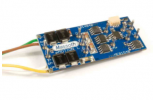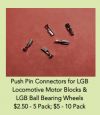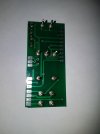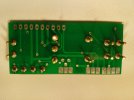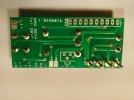I have 3 old LGB locos using the 55021 direct-decoder interface. I'm trying to build some adapters so that I can mount a new decoder into the existing interface. However, I'm having real problems sourcing pins that will fit into the sockets.
Standard 0.9mm PCB pins are way too loose.
I did find a male header with 0.1mm square pins (link to product). These are almost firm in the socket - I think if I extract the pins from the plastic mount and put a light layer of solder on each then they may be an OK fit. As it is, I'm concerned that if they shift a little they may momentarily lose contact resulting in power issues.
Can anyone link me up with someone who can supply actual pins for this interface? I need at least 30 and preferably 50.
Why do it this way rather than direct-solder a new decoder?
Standard 0.9mm PCB pins are way too loose.
I did find a male header with 0.1mm square pins (link to product). These are almost firm in the socket - I think if I extract the pins from the plastic mount and put a light layer of solder on each then they may be an OK fit. As it is, I'm concerned that if they shift a little they may momentarily lose contact resulting in power issues.
Can anyone link me up with someone who can supply actual pins for this interface? I need at least 30 and preferably 50.
Why do it this way rather than direct-solder a new decoder?
- I preserve the original interface in case I want to test something using the original decoders
- by building an adapter harness I can easily pop decoders out and put them in a decoder tester and or swap / upgrade them.

